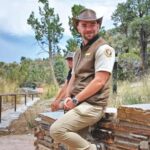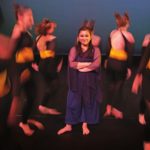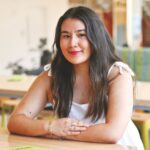
Chemistry major resets after solar-powered-cell research setback
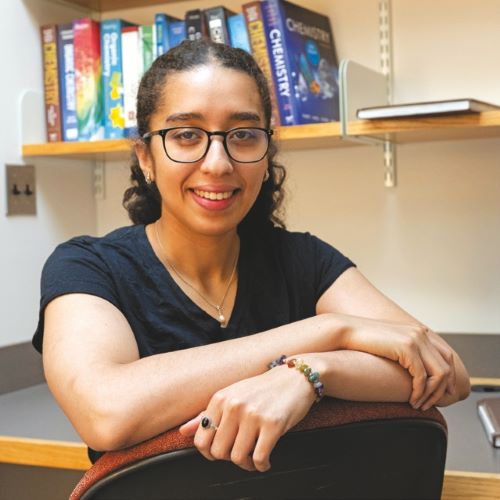
Ferdawss Ihiri ’23 grew up in Morocco, where students who wish to study abroad typically attend school in Paris. Traveling to the United States to attend The College of Wooster and majoring in chemistry wasn’t exactly an expected choice. “Coming to Wooster was serendipity,” says Ihiri. “I hated chemistry in high school, but it changed at Wooster.” She credits her introductory classes and professors with an amazing experience that led her to become an analytical and organic chemistry lab assistant and spend two summers completing mentored research with professors.
Ihiri learned to embrace change throughout her four years at Wooster, having to learn laboratory skills through video calls during the COVID-19 pandemic and even changing her Independent Study topic in late spring 2022 after she’d begun working on it. She and her mentor, Professor of Chemistry Paul Bonvallet, both panicked when they discovered that somebody had already published a paper on her very same idea. “It was a good and bad discovery because my idea was tangible, but it was already done,” said Ihiri. “We’re not interested in replicating the literature. We’re interested in generating new research and making discoveries of our own.”
“This experience taught me to always be on the ready because unexpected things will happen. Research is never linear. You just have to keep going.”—Ferdawss Ihiri ’23, I.S. title: Preparation of Porphyrin-PYBOX: A stepwise synthesis of functionalized diethynyl-bridged porphyrins for a potential application in solar energy conversion, mentor: Paul Bonvallet, professor of chemistry
Luckily, Bonvallet had upcoming plans to meet with Professor David Modarelli, a 1986 Wooster chemistry graduate who now teaches at the University of Akron. Modarelli hosted Bonvallet during a research sabbatical in 2020-21, and he understands the rewards and challenges of I.S. “Professor Modarelli was instrumental in providing ideas for how to pivot from the original project to a new one,” said Bonvallet. “In the end, Ferdawss’ project was very different from our initial plans.”
Modarelli has advised dozens of undergraduates, graduate students, and postdoctoral fellows through the years. The trio met virtually every few weeks to review her progress and discuss how to proceed. “Ferdawss is a very bright and hardworking research student!” said Modarelli. “She worked as well as if she were an experienced graduate student.”
The research focuses on highly colored molecules that self-assemble into stacks, with the goal of developing new materials that could lead to better solar cells. Ihiri made a multicomponent molecule as a candidate for a photovoltaic device (better known as a solar cell), which harnesses sunlight to produce energy. The molecule’s porphyrin core that has the ability to absorb sunlight, while other components attached to porphyrin help the whole molecule self-assemble into stacks.
Organic compounds like this offer a lot of benefits and can be used in solar cells, but chemists can’t build a device molecule by molecule. The class of compounds in Ihiri’s project are programmed to spontaneously self-assemble without any outside influence. Their stacked arrangement leads to better charge-generation and charge-transport properties in a device.
“Research in synthetic organic chemistry is like working in a kitchen without a cookbook,” said Bonvallet. “You have all the basic tools and ingredients, and you know what you want to make, but there’s no set of instructions. You have to design the instructions yourself.” He explained that some of their “recipes” hit dead ends, and they often kept revising reaction attempts in search of more efficient time and material methods.
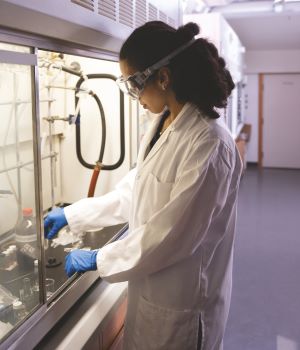
Ihiri surpassed her faculty mentor’s expectations in focus and productivity in the lab.
Ihiri began her lab work in August 2022 and spent three to four hours every day after class handling chemicals and performing reactions as part of the multistep synthesis. Despite having to relearn lab skills after the pandemic, Bonvallet said Ihiri surpassed his expectations for focus and productivity in the lab. But that’s not the only area where she shines. “Ferdawss is extraordinarily good at searching for published papers on her research topic,” said Bonvallet. “Whenever we needed to redesign part of her project, she always had ideas based on similar work in the field. Many times, it wasn’t me teaching her but her teaching me!”
Almost two months into her efforts, she discovered contaminated solvent from the manufacturer and had to purify her compound, resulting in a partial loss. “I couldn’t just throw it away, so I researched literature to figure out how to purify it,” recalled Ihiri. “This experience taught me to always be on the ready because unexpected things will happen. Research is never linear. You just have to keep going.”
There’s no doubt Ihiri will keep going on this path of chemistry research. If a pandemic, new I.S. topic, and contamination won’t stop her, it’s likely nothing will. As a Muslim woman of color in a white-male-dominated field, she’s blazing trails that will make it easier for others like her to follow.
“I didn’t really have to think about diversity all that much because I didn’t feel any different than any other person pursuing an advanced degree in science,” said Ihiri. “I’m sure I’ll feel this later on in grad school, but Wooster has really helped me know my worth and claim my place within the chemistry field.”
Posted in Independent Study on July 9, 2023.
Related Posts
Related Areas of Study
Chemistry
Access to labs, research opportunities, and small classes give chemistry majors lots of options after graduation.
Major Minor
